#people compare humans to gods when writing about us from an animals pov which is cute but bestie you are a great ape at your best
Text
The only reason I can put up with humanity sometimes is because I’m a vegan and I’ve spent so long convincing people that we’re animals too I’ve begun to believe it.
Like I would not yell at a dog for being annoying so I will not yell at a Greg. He’s just an animal. He just wasn’t socialised properly. He just needs a snack and a time out and I’m sure we can settle this like adults.
It’s also helped me be kinder to myself, like when the world feels like it’s falling apart that probably means I need enrichment so I have to take myself for a walk. Nine times of our ten the problem is fixed
#can’t be cruel to humans because they’re animals and I’m a vegan mindset#people forget that adults are just animals and also children that grew up#we are not all that complex#people compare humans to gods when writing about us from an animals pov which is cute but bestie you are a great ape at your best#the difference between us and most animals isn’t the difference between us and god#it’s the difference between a chimp and an ant like let’s be real
13 notes
·
View notes
Text
Thornfield Hall, Manderlay, and Louis de Pyromaniac du Lac
I wanna talk about Louis' depression, Anne Rice's grief, and the element of fire in a few iconic Gothic romances/horror stories. (Trigger warning for suicide.)

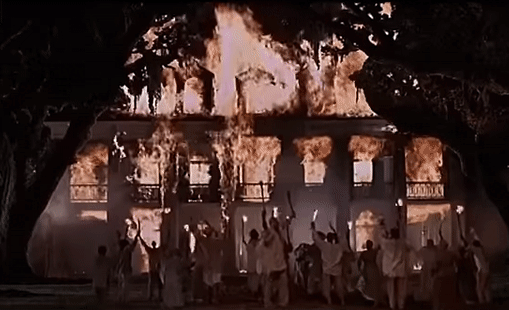

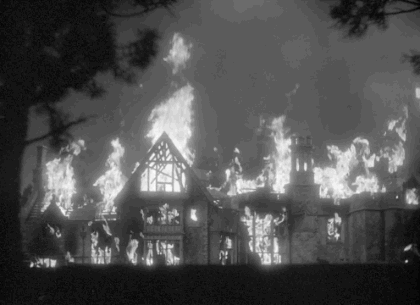
Bar none, my favorite thing about Louis is his obsession with fire, and how it's linked to his abuse, mental instability, and trauma.
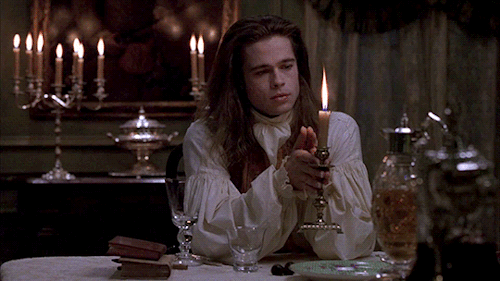

It's so neat how AMC's Louis chainsmokes when he's stressed, and has a hilarious attachment to the incinerator.


His fire obsession's a whole meme at this point, & everyone's excited for Louis going ham with fire in Season 2. I can't wait to see how AMC handles his most iconic book/film moment(s).
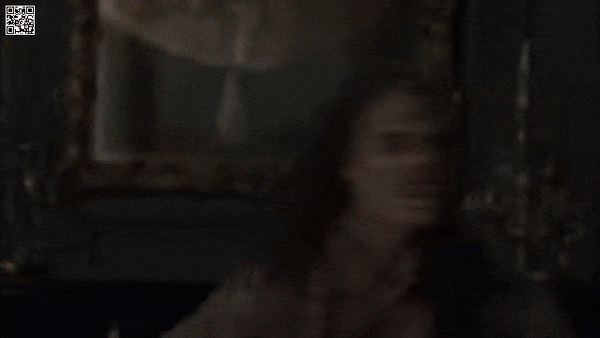
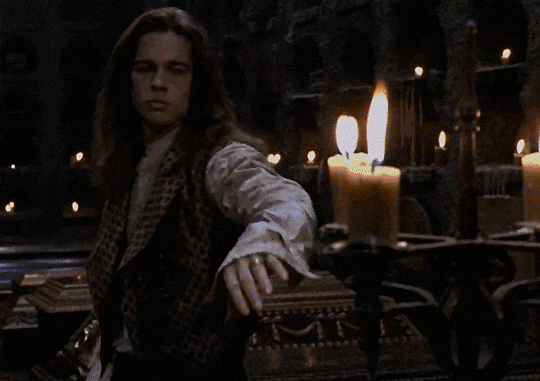
But I was rereading Jane Eyre, and thought alot about Bertha Mason (Mr Rochester's archetypal crazy wife in the attic), and Mrs. Danvers from Rebecca (which was inspired by Jane Eyre). And they got me thinking about fire and suicide in the Vampire Chronicles, so walk with me a bit.
Louis is called the most "human" of the vampires, because of how weak he was, compared to other vampires his age (and even younger). His rat/animal blood diet was tantamount to an eating disorder that heavily stilted his growth as an immortal, and for the majority of his life he lacked many of the Gifts vampirism afforded his peers (Mind Gift, Spell Gift, Killing Gift, etc).
However, shockingly enough, AMC decided to give Louis one of their most potent powers: The Fire Gift (pyrokinesis).
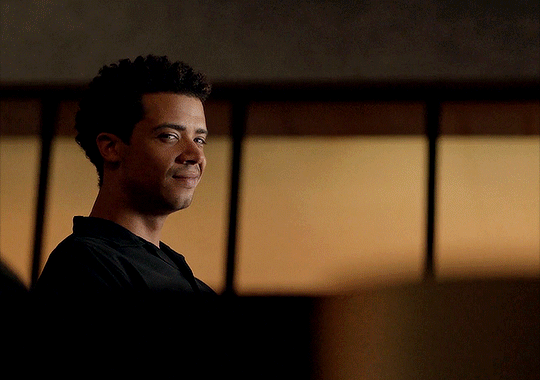
In the books it was explained that vampire blood is flakey & highly flammable, and only the oldest and/or strongest of vampires could withstand fire without serious injury or death--let alone use the Fire Gift to any significant degree--hence: BAMF Akasha using it as her signature attack in QotD. 👑
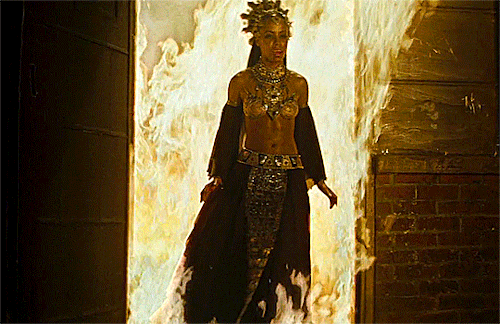
This seriously begs the question about where this show sits in the canon timeline, because book readers know that Louis only gains the Fire Gift, Cloud Gift, Mind Gift, etc etc after the events of Merrick, when Louis tries to commit suicide, and to heal Louis' burns, Lestat gives him a huge infusion of his powerful blood (having fed at length from Akasha in QoTD, and also God/Jesus in Memnoch.)
Lestat's super!blood healed Louis' burns and saved his life, but it also drastically & permanently changed Louis' body, making him more vampiric than he'd ever been, seriously augmenting his powers. This was something Louis had adamantly been trying to avoid--every time the Children of the Millennia/Coven of the Articulate met up, they all offered Louis infusions of their ancient blood, trying to help him power up, and every time Louis refused them all.
Louis retaining his humanity was so important to him, not only because of the Catholic Guilt he felt being a blood-drinking killer, but also because being physically weak allowed him one ultimate ace up his sleeve: if he ever got the courage to end his life, he could always rely on going into the sunlight, and burning to death.
So, while AMC's dust particle effect is very cool, I'd rather see vampires on FIRE--even though the ashes to ashes visuals are rather apropos.
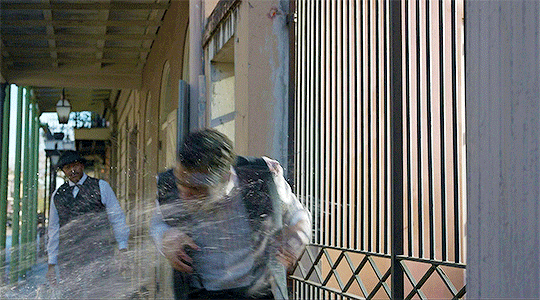

Regardless, I was also thinking about all the other people & places Louis set on fire; and how it all ties in with the Gothic literature Anne Rice was CLEARLY inspired by--namely: Jane Eyre & Rebecca.
Cuz we know Anne Rice wrote Louis and his grief over losing Claudia as a self insert, as a way for her to try handling her own grief over losing her daughter. But she started hating writing as Louis, and being stuck in that depressive mindset, so AR switched to writing from Lestat's POV instead, as a more fun and carefree character for a few books--until Lestat had a crisis of faith in Memnoch and goes into a coma. We then get Armand's book, where in TVL Armand tries to commit suicide by walking into the sun after Lestat gets Veronica's Veil from Memnoch (i.e.: proof that God exists, from the Devil). Immediately after this is Merrick, where Louis enters another depressive episode, as he waits vigil for YEARS beside Lestat, who lies on the floor of a cathedral in a coma. As Louis mourns, he finds Claudia's diaries, which reveal just how much she hated & resented him, and he starts being haunted by Claudia's ghost. By the end of Merrick, Claudia's ghost has convinced Louis that he's worthless, and he agrees.



Suicidal ideation is HEAVY in both Jane Eyre and Rebecca. Mrs. de Winter is almost talked into jumping from the window by the housemaid Mrs Danvers, who hates that the widowed Maxim de Winter remarried (forgetting his first wife Rebecca), and gave Manderlay to the new wife--a girl half his age with no clue how to be a "proper" lady of the estate.
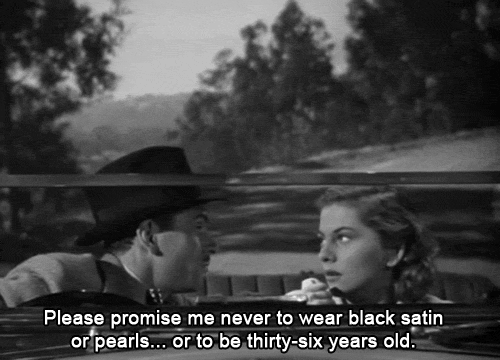

In Jane Eyre, Bertha Mason is literally insane, and was locked up in Thornfield's attic, until she escaped and set the place on fire, then jumped off the roof to her death. In the 2006 BBC version, Bertha sees an owl (a nocturnal bird) fly off the roof, so she follows it; like a free bird taking flight.
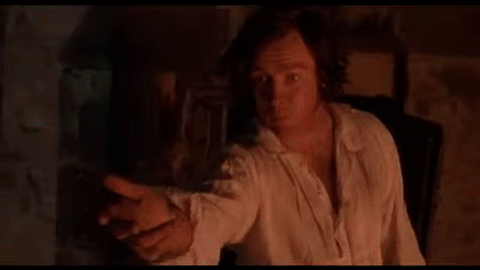
Who else does this in IWTV? PAUL with his birds. (Not to mention the PTSD from Louis' drop in Ep5, which would've definitely killed a normal person.)

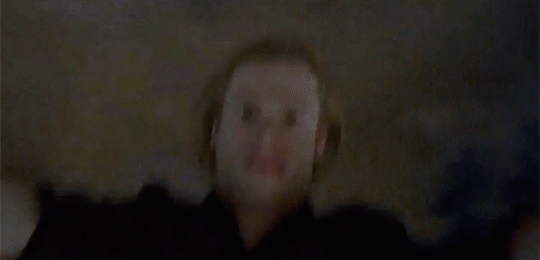
For years, I thought Claudia's ghost was just an apparition: either one of the demons Lestat unleashed while fleeing Hell in Memnoch, or more likely as a manifestation of Louis' guilty conscience, as his mental state got increasingly worse as he read her journals; on top of him being scared Lestat was dying. But then Blackwood Farm introduced Goblin, and all the later books had prominent vampire ghosts that proved that vampires (and aliens, lol) have immortal souls that can linger. So the ghost was legit, and so was Claudia's deep-rooted hatred for Louis.


I've already said how I think IWTV is a story about (failed) marriages and parenthood dynamics, the power imbalances that ensue, and the resentments that fester. But so are Jane Eyre & Rebecca. At the heart of ALL of them are mental illness & houses on fire. Bertha Mason was violently insane, but she was sane enough to realize that Mr Rochester was tryna marry another woman right under her nose, when it was HER dowry money that bankrolled Thornfield, as his first wife. So in the 2006 version Bertha lights Jane's wedding dress on fire, taking the whole mansion down with her. (In the book she just tears up the dress & veil, then starts the fire.)

In Rebecca, it was Maxim's first wife Rebecca who was cheating, but the (nameless) second wife lived under her shadow & the ghost of her memory--embodied by Mrs. Danvers, who hated her guts, and fed into her deep insecurities over being married to a widower who hadn't gotten over his first wife Rebecca (*cough* little did they know though~! XD). After failing to talk the girl into killing herself, Mrs Danvers had a psychotic break, and set Manderlay on fire, dying in the blaze (joining her beloved Rebecca).

Taking the Gothic horror & suspense out--or, hell, INCREASING it--one could easily spin this so that JANE was the one who started the fire when she learned about Bertha in the attic and ran away from Thornfield (in some adaptations the fire happens the same night she leaves). One could also say that MRS DE WINTER burned down Manderlay after cracking under the pressure of becoming a married lady. Both of these second wives were driven crazy by ghosts of the past, and burned down the mansions that had become their tombs.

Cuz I mean...Louis is Lestat's second wife/husband, after Nicky killed himself in a fire. 👀 And Louis and Claudia literally watched as they burned Lestat's sidechick/third wife Antoinette alive, so.... 🔥

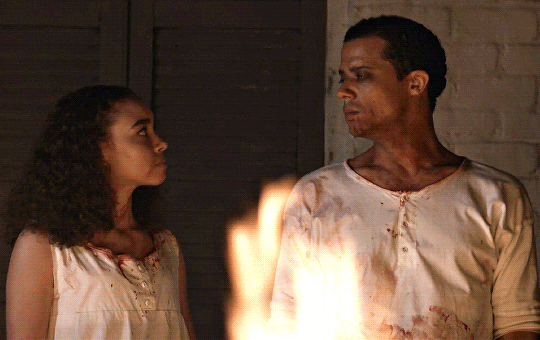
TL;DR: I think Anne Rice must've been struggling with a lot of suicidal thoughts around the time she wrote The Vampire Armand (book 6) and Merrick (book 7), to have both its characters do the same thing, one right after the other. Vampires and their vulnerability to fire/sunlight were just metaphors for very real personal issues. After writing IWTV, she walked away from Louis, burying her depression by writing more books as the sunny Lestat, who suntans for fun and is immune to fire by the end of QoTD. But in the back of her mind, AR might've felt guilty forgetting about her grief (Louis forgetting about Claudia--willfully forgetting about Bertha, Rebecca, etc....). So the ghost of this guilt came back with a vengeance in Merrick, as Claudia unleashed all her vitriol on Louis, and he hated himself to the point that he was convinced to light himself on fire--the sole reliable escape from misery he had left.
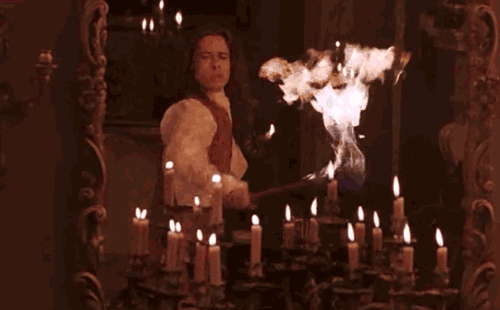
#louis de pointe du lac#loustat#interview with the vampire#tw: suidice#tw: sucidal thoughts#tw: sucidal ideation#jane eyre#alfred hitchcock's rebecca#must see tv#Pyromaniac du Lac#iwtv tvc metas
64 notes
·
View notes
Text
Bi-Han’s rudeness...?
I guess, it’s common idea that Bi-Han was the rude (if not the rudest) Lin Kuei warrior we had a chance to meet. Mythologies: Sub-Zero and Mortal Kombat 9 (2011) pretty much embody elder Sub-Zero’s crude and sarcastic nature. It was especially seen around Scorpion, his enemy (”Will not...or cannot?"; "To hell with your clan!“), but even around Grandmaster - the ultimate superior & Quan Chi, the important client of Lin Kuei (accussing Quan Chi on hiring another assassin for the same mission and generally being go yourself there if you so badly want that stuff) or Raiden - the god (”That's it? Not even a thank you?").
We may only guessing if Bi-Han at this point of story was simply done with everyone around him, or if the lack of manners & respect ties directly to cryomancer’s genes or did he do that on purpose. Regardless the reason, Bi-Han’s cold, often harsh way of speaking to others distinguishes him from the few known Lin Kuei warriors. Of course, the lack of game examples how he interacts with fellow Lin Kuei, from companions sent on the same mission to his own brother, only adds to general impression of Bi-Han’s rudeness.
Also, comparing Bi-Han’s attitude to Sektor-Cyrax and Smoke-Tundra (Sub-Zero II) duos, where all other warriors to some degree had strong and/or complex ties to each other, the personal isolation of Bi-Han really stands out.
Of course, we know from games and other sources that Kuai Liang cares deeply for his brother and Sareena over the course of years has some emotional ties to Bi-Han as well. But frankly, we are more told that by them than really have insight into Bi-Han’s psyche. I mean, we still don’t have any clue why he would spare Sareena in Mythologies, have we? What only adds to the feeling of Bi-Han’s isolation; we scarcely see him interact with other characters that aren’t stricte enemy.
This is why I want bring three moments from other than game sources, in which Bi-Han thinks about or interacts with people that seems to be liked or at least respected by him.
Mortal Kombat 4 Limited Edition Comics,
in which we are told by narrative that “Several Days later, on Earth, Sub-Zero returns to China to the ancient Temple of the Elements. The Temple’s location is secret, but Sub-Zero learned how to find it from his older brother, the original Sub-Zero.”
So, between one mission (Shinnok’s amulet) and another (Tournament), Bi-Han found time to talk with Kuai Liang. And shared informations about his important assigment. Of course, we do not know Lin Kuei rules, but I don’t think that revealing details of the mission was ever well appreciated. Still, Bi-Han told his brother where to find Temple, and from the panels below, what was there (Shinnok’s amulet), why it was important (”the amulet that keeps [Shinnok] trapped in the Netherrealm”, ”as long as the amulet remains on Earth, Shinnok cannot escape the Netherrealm”), who guarded it (Four Elements / gods of water, earth, fire and wind) and though it wasn’t show in flashback itself, most likely that Bi-Han fought them all.
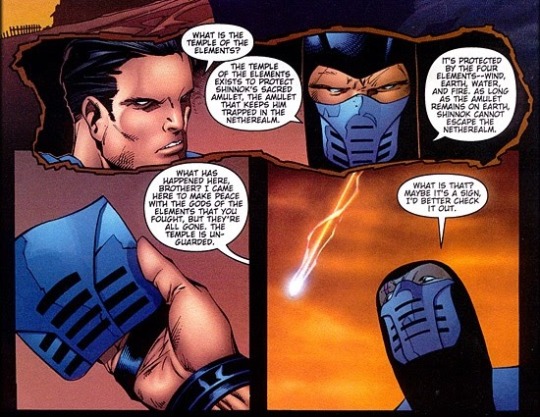
The flashback itself is really short and part of their talk must happened off panel, so we don’t know how much Bi-Han told Kuai Liang, nor why. But we must remember that in Mythologies: Sub-Zero, Bi-Han alone never heard about Shinnok or Netherrealm before the mission (”Quan Chi could simply be a lunatic sorcerer. I've never heard of an Elder God named Shinnok! Or of a place called the Netherrealm! “) and if he didn’t know that back then, Kuai Liang most likely didn’t either. By sharing his newly acquired knowledge - with or without consent of the Grandmaster - Bi-Han gave his younger brother additional informations that may someday be useful (or maybe even save his brother’s life, especially if he get involved with another Shinnok-related mess).
Did Bi-Han told the story to warn Kuai Liang, or just to satisfy his brother's curiosity, we can’t be sure. Maybe his reason to do so was mix of two, maybe something completely different. What is important, Bi-Han found time to talk to Kuai, even though he did not have much of it between last and future mission.
Bi-Han told the informations in rather stolid (no emotional) way. No rude, but not overly warm, personal way either. Straight to the point, I would say.
Mortal Kombat book by Jeff Rovin (1995)
is a book in which original Sub-Zero is both rude/sarcastic and even more brutal than usual (game) self. Also, is Shang Tsung’s favorite assassin. Unfortunately for sorcerer, “Bi-Han” was not available for important mission; after killing his former partner who left Lin Kuei/criminal life, Sub-Zero went into hiding and no one knewn where in China he is, not even other members of the Lin Kuei.
This turn of events upsetted/annoyed the sorcerer but of course, Shang Tsung is not someone to give up so easily, so he used magic ways to find Sub-Zero. On the occasion,we learn more or else that “Bi-Han” not only brutally killed his former companion (”Scorpion”) but also offended demigod:
There was a long pause. “I… am looking.” Then, the disembodied voice said, “I see him… Shang Tsung. He is hiding.”
“Where?”
“In a cave… in a cliff… north of Wenzhou.”
“That’s just like him,” Shang Tsung said. “With the fees he charges, he could live in splendor. Yet he chooses a life of hardship and study.”
“And death!” Ruthay said.
“Yes, death,” Shang Tsung admitted. “Don’t be too harsh on him, Ruthay. Some people deserve to die. I will summon him–”
“Wait! Be warned, Shang Tsung. He is cursed!”
“Cursed? By whom?”
Ruthay wailed, “By the immortal Yu.”
Shang Tsung felt cold spiders crawl up his spine. “The demigod Yu?”
“Yes… he who is said to dwell in the underground caverns of Horse Ear Mountain… which is sacred to the goddess Kuan Lin. He who protects the canals… and the tunnels… and looks after all who use them, human and animal.”
“What did our brash friend do to Yu?”
“He… killed a man,” said Ruthay.
“What man?”
“A toll-taker… one who had given up a life of crime… one who had been a partner of the man… you… seek.”
“And how did that crime come to the attention of the spirit of Yu?” Shang Tsung asked.
“The man was killed… slowly disemboweled with a sword… while accomplices forced his wife and his son to look on! After his murder… the man’s remains… were dumped into a canal!”
Shang Tsung raised an eyebrow. “Is that all? I was expecting something truly terrible!”
“It was!” Ruthay shrieked. “When he disposed of the body… in that way … he profaned one of the sacred waterways… of Yu!”
Shang Tsung smiled now. “Then he is definitely the man I want,” he said. “Anyone who is impudent enough to insult a demigod won’t be afraid to attack a member of the White Lotus Society, or the gods who watch after them. I will send Hamachi, Ruthay. When he nears his goal, see through his eyes and guide him!”
So, book!”Bi-Han” is by no means a nice person. Sub-Zero spent years searching for a man that betrayed Lin Kuei and when finally found him, not only killed him in brutal way while accomplices forced man’s wife and son to watch his flesh ravaged and his blood spilled, to see his intestines and stomach exposed, still alive, as he squirmed and shrieked and died but also thrown the battered body into sacred water of demigod Yu. And from “Bi-Han”’s own POV: even if Yu himself crawled into the cave, he would find the killer unrepentant and willing to kill the former ninja again.
Because Sub-Zero does not fear (nor respect(?)) gods, Shang Tsung was even more willing to hire “Bi-Han” to do the important job (”Then he is definitely the man I want,” he said. “Anyone who is impudent enough to insult a demigod won’t be afraid to attack a member of the White Lotus Society, or the gods who watch after them”). To reach Sub-Zero in warrior’s hiding place, Shang Tsung sent his precious, the most trusted bird to carry his messeng:
But some of the birds were kept more for practical purposes. His falcons were trained to fly to the mainland and kill with claws of poison, while his beautiful white pigeons were trained to carry messages to spots all across eastern China.
Going to a small writing table tucked in a corner of the stone chamber, Shang Tsung lit a candle, dipped a fountain pen in red ink, and wrote in small, tight characters on a slip of rice paper:
LIU KANG AND TWO OTHER MEMBERS OF THE WHITE LOTUS SOCIETY ARE CAMPED TO THE WEST OF WUHU, HEADED EAST TO INTERCEPT A BAND OF BLACK DRAGONS. THESE INTERLOPERS MUST BE STOPPED. YOU ARE MY LAST HOPE. RETURN THE BIRD WITH A TOKEN SO I WILL KNOW THAT YOU HAVE GONE AFTER THEM.
SHANG TSUNG
After finishing the message, the sorcerer went over to one of the cages, carefully removed a pigeon, rolled the paper around its right leg, and fixed it there with a length of red string. Holding the bird in both hands, he made his way under and around the many cages to the window. The black shutters of the window were closed, and one of the hooded servants scuttled over, released the catch, and threw it open.
Shang Tsung bent close to the bird and said softly, “I know you won’t fail me as my fellow humans have, devoted Hamachi. Fly true and take my urgent message to the region you know so well. Ruthay will see through your eyes and guide you from there. Then return to me, my delicate servant. Come back safely and soon, and I will offer up a human sacrifice to you.”
So, from the book it’s clear that Shang Tsung had high respect for Sub-Zero’s skills and to some degree was familiar with Bi-Han (”That’s just like him. With the fees he charges, he could live in splendor. Yet he chooses a life of hardship and study.”). Looking at how often Shang Tsung asked/demanded to know why he “couldn’t get the man I wanted“, I dare to say even a bit obsessed with hiring him. But then again, Shang Tsung had a lot to lose if the mission failed, so of course he wanted the best assassin for the job.
The cave was located two hundred miles south of Shimura Island, though it was still hours before dawn when the pigeon reached it. Landing in the narrow mouth, the bird cooed once then stood still, as it had been trained to do.
The ninja was awake and beside it in an instant, crouched beneath a ceiling that didn’t allow for him to stand. Dressed only in a white loincloth, despite the cold floor and chill air in the cave. He was reading the message by moonlight a moment later.
A smile crossed his lips, lips so pale and claylike that they appeared dead. His small, very narrow eyes looked from the message to the bird to the moonlight that lit just the entrance of his dark abode.
He ran the back of an index finger up and down the bird’s breast. “Good Hamachi. Return to your master so he will know that I have received his message and am on my way to do his bidding. For a price, of course,” he said. He glanced at the several pyramid-shaped stacks of scrolls in the rear of his cave. His fee was another manuscript from Shang Tsung’s library, one of the many scrolls that were centuries old, dating back to the dawn of the days of the first ninjitsu and containing arcane secrets of the league of assassins to which he belonged, the widely-feared Lin Kuei.
"Bi-Han” smiled at the new task and I think this was a genuine smile; something we rarely had a chance to see. Of course, it may be related to great price he will get, another precious scroll from Tsung’s own collection (what alone raises a question like was Sub-Zero even allowed to work for Shang Tsung without the proper Grandmaster’s approval, because it seems he was hired by sorcerer quite often). So, either he was simply happy to have something dangerous (challenging) to do or the mere idea of new stuff to read warmed his heart or most likely the smile was reaction to mix of those two things.
Does this have anything to Bi-Han’s rudeness? The reaction to carrier-pigeon is unusual and frankly, pretty warm for Sub-Zero’s cold, impersonal nature. Especially compared with his previously described brutality. He did not mind killing a man in front of victim’s wife and son (who both were forced to look on the whole homicide). A man, that was once Sub-Zero’s partner / member of Lin Kuei.
But then when Hamachi brought him messenge, “Bi-Han” ran the back of an index finger up and down the bird’s breast what itself sound as rather affective gesture, petting an animal that did not belong to him in the first place. Even if he was aware how important the bird was to Shang Tsung, that still does not mean he needed to pet it, or praise (“Good Hamachi). Also, looking at sorcerer’s messenger, there is only RETURN THE BIRD WITH A TOKEN but “Bi-Han” knew (and used) its name. The whole scene is interesting because there is no real reason why he should bother to be nice to simply carrier-pigeon, but I think it is right to assume “Bi-Han” to some degree was fond of the animal. Maybe even of Shang Tsung... For a price, of course.
Later in the story, “Bi-Han” was capable of working with Goro and Reptile albeit still was at times sarcastic too. Nothing really drastic, for Sub-Zero’s standards. And hey, even made a joke/snickered at Scorpion’s expense (thinking about it, that frankly is normal thing for Bi-Han):
“Calm yourself, Goro,” said Sub-Zero. “What is your name, boy?”
“I am Scorpion,” said the youth.
Sub-Zero snickered. “I’ve eaten Scorpion, and had scorpion soup. I can’t say I cared for either. Now, tarantula stew–”
“You murdered a toll-taker,” Scorpion cut in. “He was a gracious and blameless man, a gentle husband and caring father.”
“Ah,” said Sub-Zero. “You are... the son?”
So, in the novel “Bi-Han”
showed little respect to demigod Yu,
brutally killed a man that once was his partner but who betrayed Lin Kuei; thus was hunted down and eliminated
was sometimes sarcastic yet capable of working with other Shang Tsung’s no-human servants without much trouble
showed some fondness for Hamachi, by petting & praising the animal and in general seemed to have good working relationship with Shang Tsung
had at least one moment in which said something more personal (two, if we take the joke about eating scorpions and tarantual stew seriously)
Overall, “Bi-Han” is rude and sarcastic but also capable of being gentle & nice( r) to the few he likes(?); in this case mainly to bird Hamachi.
MORTAL KOMBAT BLOOD & THUNDER (1994)
is another take on first Tournament. The Lin Kuei clan was represented by Sub-Zero and Hydro. During journey to Shang Tsung’s Island, the two warriors kept distance from others. When Kano and Johnny Cage fought at ship deck, “Bi-Han” watched it from safe place. When Hydro asked what is going on there, Sub-Zero only stated “a petty altercation, Hydro. It is no concern of the Lin Kuei”. Despite the impersonal answer, the warrior could tell something is bothering “Bi-Han”
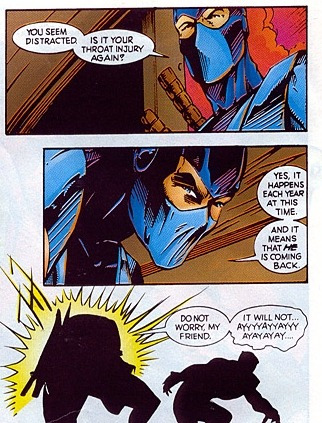
Unexpectedly, Scorpion (the Wraith) showed himself, telling Sub-Zero he is gonna kill him and so on, you know the drill. The biggest difference between Mythologies & MK9′s backstory of the conflict is that, “Bi-Han” and Scorpion fought one on one, to test which clan is better and “Hanzo”’s revenge is more about getting into afterlife between his dead ancestors (who for some reason denied him that) and that Shirai Ryu ninja is more dramatic. Like, wishing to kill every “Bi-Han”’s friends, then family, then finally him, even though he died in fair fight. Anyway, Scorpion left and Hydro saved “Bi-Han”’s life
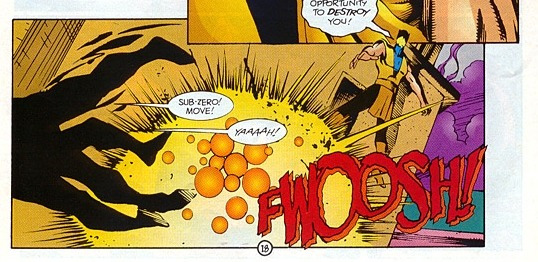
and soon after that once again Hydro was asking if “Bi-Han” is all right
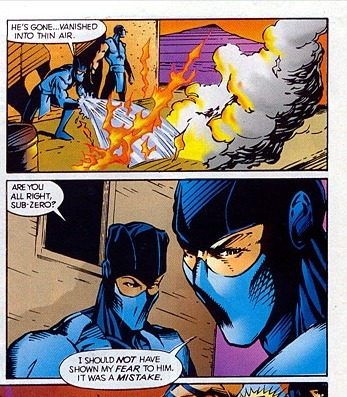
Here some interesting details:
When Hydro asked about Sub-Zero’s physical injury, “Bi-Han” truthfully answered, adding how it happens every year on the same day. He does not keep any ‘tough guy’ act around friend (and looking how Hydro can tell how “Bi-Han” is distracted and knows about his injury, saves his life and in general is assuring/caring, I think this is correct way to call Hydro).
Yet, when Hydro asked if Sub-Zero is all right, “Bi-Han” did not answer that directly. Instead of telling how he is emotionally / mentally feeling, the warrior already was analyzing situation and pointing mistake he did (showing fear)
In both cases, it seems like Hydro is the one more emotionally open and/or supporting of the two. “Bi-Han” does not show much emotions, however he is willing to admit his fear of Spectre, to share informations about the injury - like what the pain means (”he is coming back”) - does not ridicule Hydro for worrying about him, does not bother with tough guy act at all. I wouldn’t say Sub-Zero is overly warm and open there, but definitely not rude or sarcastic. He does care when something is happening to Hydro, but unfortunately does not show much emotion after the warrior was killed by Scorpion. Then again, “Bi-Han” at that point of story is no more affraid of the Spectre and is pretty much willing to kill him again. And did fight against enemy, even though Raiden took him under his protection. So, maybe Sub-Zero did not speak about his feelings but the change from fear into I’m gonna kill you again could be motivated by his friend’s death?
I’m bringing Hydro and Sub-Zero’s relationship for the contrast between how “Bi-Han” is acting around his close(?) companion and people he does not know nor care for. Like Sonya and her partner from SF, who get on Shang Tsung’s ship to find and arrest hiding there Kano.
Just after Scorpion dissapeared, the US soldiers accosted Lin Kuei, looking for a bit cooperation to find Kano. Sub-Zero’s reaction?
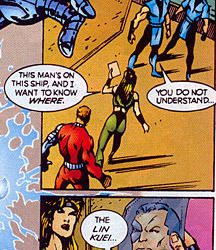
and

So, “Bi-Han” very quickly changed from admitting to companion making mistake / showing fear to enemy to “You do not understand. The Lin Kuei do not have to cooperate with anyone!” (saying it while buring picture of Kano, because this is how much he cares) and “Bah! Your threats mean nothing to me, woman” (while totally not caring to call Sonya by her name she told him just moment ago. Rude.)
Those three examples made me think of Bi-Han as someone who is rarely warm to other people, even those he is close to. Even while talking about important and sensitive things, he rather talk in impersonal way. Maybe this is result of Lin Kuei training, maybe just Cryomancers are like that. But for sure Bi-Han’s way of speaking and acting change depending on in whose company he is. Sarcastic and rude way of speak and act is usually directed at people he dislike, does not trust or care, or at gods in general. Which makes probably a long list of people that fits those categories.
Bi-Han may be unable (or not willing?) to be overly warm/nice to people (and creatures/animals?) he likes and/or respects, but at the same time is willing to share important informations, answer their questions, does not ridicule them (as far as we coul see in those little examples) for caring and/or showing their care for him and even praise (at least Hamachi). I think Bi-Han is the type of cold, collected person but no less honest, who does not know (or does not want) how to tell people about his feelings but is showing how he care by small gestures (telling the truth about injury, sharing information, petting the bird).
Of course, this is just my take on Bi-Han, based on various sources (games, books & comics), but I really believe he was not the type of brother to be rude or sarcastic toward his younger sibling or close comrade (unless the situation called for him acting that way). Everyone else though deserves all the rudness and sarcasm.
So, in short, it’s not like Bi-Han can’t be nice(r), it’s just that the list of people he care for and respect is really short.
#mortal kombat#bi han#sub zero#hydro#shang tsung#hamachi#sonya blade#kuai liang#also i'm still sad that partnership of hydro and bi-han was cut from mk9 / new timeline#cryomancers are just sarcastic and asocial by nature#but that does not mean they are rude bastards to their own siblings and close companion#he is just the type of cold personality#not overly emotional#an extreme introvert#yeah i think that is right description for bi han#but sometimes it upsets me how many people made him awful rude brother to kuai liang#noob saibot is corrupted version of bi han#without human feelings#not 100% version of bi han#my rants
134 notes
·
View notes
Photo
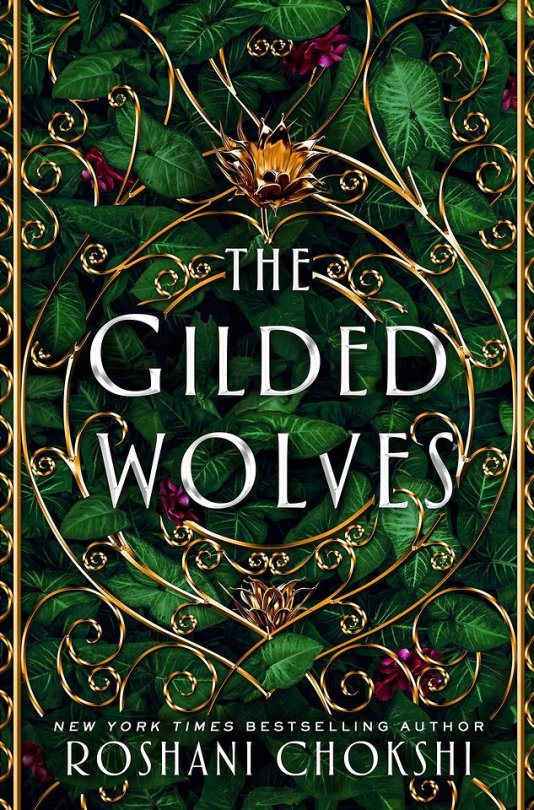
Title: The Gilded Wolves
Author: Roshani Chokshi
Genre: fantasy, young adult
Rating: 4/5
~Beware of spoilers~
I feel like lots of people picked up The Gilded Wolves expecting it to be Six of Crows 2.0. Because of that the review section is full of people who were either disappointed that it’s not similar enough or enraged that there are some parallels between the two but they aren’t “good enough” to be an actual copy. It’s disappointing because there’s so much more to say about this book than comparing it to another.
The story takes place in Paris in the year 1889 during Exposition Universelle. Séverin, a hotelier at day and a treasure hunter at night, is trying to restore the inheritance that was unjustly taken from him by the Order of Babel - an organization focused around a fragment of the Tower of Babel that supposedly brings magic and fortune to the place where it’s located. Séverin was supposed to become one of the Patriarchs - heads of the four houses of the Order in France, but, as he believes, his test had been falsified and he was stripped of privileges. However, during his search, he comes across a compass with a map to an artifact that could turn the world and the Order upside down. and along with a group of friends decides to find it.
The Gilded Wolves is a treasure hunt book. Reading it I couldn’t help but think about Indiana Jones, The National Treasure or The Mummy movies. There was even a scene where the characters are chased by a flaming rock rolling down the tunnel. The book was action-packed but between the action, there was always time for some banter or sweet, familial moments. Not to mention the writing that was absolutely beautiful, full of lush descriptions absolutely raw one-liners. The plot had some great twists. One at the end left me hungry for more and I can’t wait for the second part of this book.
A common complaint I heard is that people found the magic system confusing. I personally can’t understand that since to me the magic system basically boils down to “people born with magic can modify things to give them special functions”. Some do it with flowers, some with stone and some with human brains. “Forging” in this context means “shaping”, shaping the object to do your bidding or shaping the human mind to see what you want it to see. Sure, we don’t exactly know the limits or laws regulating it but I don’t feel like it’s necessary for the story. In this book, magic is closely connected with building the aesthetics of the world - guards with Sphinx masks, animals made of precious stones guarding magical artifacts, dresses that have burnable layers - all of it is supposed to show that magic is deeply ingrained in the world and make it feel extraordinary and unique. Even the history of the world presented in The Gilded Wolves is connected to the magic - where the Babel Fragments were located after God destroyed the Tower civilizations grew and people were able to Forge. Europeans stole one of the Babel Fragments during their crusades and brought it to France. Along with it, they took plenty of Forged objects that the Houses collect and keep in their treasuries away from thieves’ reach.
The only thing I had a problem with was the number of Forged objects the author introduced. After a while, it was difficult to keep track of them and remember which one was supposed to do what. Not to mention there were some that even the characters weren’t sure how to use.
The Gilded Wolves had six main characters, all wonderfully diverse with their own goals. Séverin and Hypnos are French and Algerian and Haitian, respectively. Enrique is half-Spanish, half-Filipino. Laila is Indian and Zofia is Jewish and autistic. Enrique is also bisexual and Hypnos is gay. Through them, the author tells a story of racism and the effects of colonization in that period of time. Laila often gets mistaken for a maid, Enrique is considered “not Philipino enough” to be taken seriously by the group of Filipino writers he wants to join, Hypnos is looked down upon by the other house Patriarch because he’s mixed.
I loved the characters separately and I loved the friendship between them, especially between them and Hypnos. I was pretty sure he was going to betray them at first but he turned out to be an absolute sweetheart and one of my favorite characters together with Zofia. One thing I didn’t appreciate, however, was the amount of absolutely overbearing and unnecessary romance.
Each part of Séverin’s POV was full of Laila. No matter what was going on, if he remembered Laila (and he always did) his train of thought would stray thinking about that one single time they’d slept together and how he should forget about it but he can’t. It was sometime really overtaking the plot and simply tired me out. At the end of the book, I realized that Séverin was a horribly selfish character - longing for things he had but they were taken from him instead appreciating what he still had and then taking his frustration out on other people for his failure when he lost that too. The finale would go completely differently if Séverin stopped being so horny just for a moment.
Laila’s POVs were more bearable because she wouldn’t forget that she cares about other people on the team when it was convenient. Her relationships with Zofia and Tristan were sweet and caring and I also loved her banter with Hypnos and how she always wanted to believe he’s on their side. She was really fierce and honestly could do much better than Séverin.
But with just those two the romance subplot wouldn’t be so bad. Sadly it had to extend to Enrique, Zofia, and Hypnos. Zofia and Hypnos were my favorites and they deserved something better than a love triangle with a guy who can’t pick between them. Not to mention that Zofia getting upset that Enrique and Hypnos kissed came out of the blue because before them she showed absolutely no interest in him romantically. It was just so forced compared to Enrique’s relationship with Hypnos where the attraction at least went both ways from the very beginning.
Another thing that bothered me was the ages of the characters. They absolutely didn’t fit the way they acted. I would say that Séverin and the rest were around 20-25 and based on how he acted and how others treated him, Tristan was like 13. It feels so weird to see Laila mothering a boy who’s just two years younger than her. At one point Laila says that she was told she won’t live until her 19th birthday and my reaction was “Oh well, looks like they were wrong” and then she said that she still has a year and I was picking up my jaw from the floor so... yeah.
I’m also a little sad that I can’t say more about Tristan, Séverin’s adopted brother with love for big spiders and ability to Forge plants but there was just so little of him. He seemed like a character I’d grow to really love.
To sum up, The Gilded Wolves is a novel with spectacular writing, a beautifully crafted world that comes alive when you’re reading, a treasure hunt plot that felt really nostalgic to me and a cast of diverse characters. It does have its faults but saying that it’s just milder Six of Crows is doing it a great injustice. The book is also a beautiful commentary on racism and colonialism and what consequences does it has for people. I will gladly add the already announced sequel to my To Be Read list.
Amazon / Goodreads
#my reviews#book reviews#reviews#ya reviews#fantasy reviews#fantasy#ya#young adult#the gilded wolves#gilded wolves#tgw#fantasy books#ya books
7 notes
·
View notes
Text
Sansa and Tyrion’s Character Arcs (Part I: Tyrion)
Being a writer, I’ve been pouring through Shawn Coyne’s The Story Grid over the past two weeks. One of the points he makes is that every part of a story–from beat to arc–has the same 5 elements: inciting incident, complication, crisis, climax, resolution.
And being as obsessed as I am with Sansa and Tyrion of GOT in particular, I thought I’d use the hey-day of the series season finale episodes to indulge in some character metas.
We’re going to (mainly) focus on the inciting incident.
So, not only does GOT have an overarching inciting incident/complication/crisis/climax/resolution that it’s moving towards, but each season has them, each episode/chapter has them, each subplot has them, and each character has them.
According to Shawn Coyne, an inciting incident promises one thing: “…the ending.”
So let’s dive a little deeper and see what Sansa’s inciting incident and Tyrion’s inciting incident tells us about them. I’m writing separate posts since they’re both long–first up is Tyrion!
Tyrion
To start on a side note that will eventually get to the point:
I really wonder if show-Tyrion and book-Tyrion can come to the same conclusion.
Book-Tyrion is much more morally grey than show-Tyrion, for one. They make different decisions after the Purple Wedding (in the show Tyrion is notably celibate whereas book-Tyrion hits an all-time low and is not above sleeping with drugged-up, unresponsive prostitutes–though he manages to empathize with them, he still uses them to run from his own darkness).
Now, I’m equally invested in both versions of the character and believe they have the same arc/themes overall. So on one hand I can see them playing out beat-by-beat, just with different palettes, if you would, but only because of the power of the inciting incident:
So, an inciting incident does more than promise an ending–it sets the character on a path of no return. So, more than a character’s introduction, it’s when their story first goes down an irreversible path.
Furthermore, an inciting incident is called an incident for a reason: it’s not necessarily a decision made by a character, but something that happens to him (but more on that in a minute).
Tyrion’s Introduction
First we’ll note Tyrion’s introduction in the book:
“Jon found it hard to look away from [Jaime]. This is what a king should look like, he thought to himself as the man passed.
Then he saw the other one, waddling along half-hidden by his brother’s side. Tyrion Lannister, the youngest of Lord Twyin’s brood and by far the ugliest. All that the gods had given to Cersei and Jaime, they had denied Tyrion. He was a dwarf, half his brother’s height, struggling to keep pace on stunted legs….one green eye and one black one peered out from under a lanky fall of hair so blond it seemed white. Jon watched him with fascination.”
Later, still in the same chapter:
“The dwarf grinned down at [Jon]. ‘Is that animal a wolf?’
‘A direwolf,’ Jon said. ‘His name is Ghost….what are you doing up there? Why aren’t you at the feast ?’
‘Too hot, too noisy, and I’d drunk too much wine,’ the dwarf told him. ‘…might I have a closer look at your wolf?’
…he pushed himself off the ledge into empty air. Jon gasped, then watched with awe as Tyrion Lannister spun around in a tight ball, landed lightly on his hands, then vaulted backward.
Ghost backed away from him uncertainly.
The dwarf dusted himself off and laughed. ‘I believe I’ve frightened your wolf. My apologies.’”
They talk a little more, and it’s interesting to note that Tyrion isn’t threatened by Ghost, merely fascinated, and he correctly deduces that Ghost is more shy than harmful, despite Ghost baring his teeth. This could be foreshadowing that the Lannisters will have dominion over the Starks soon, but Tyrion was never a player in that. Despite his loyalties to his family, he was the one that reached out to Jon when he saw Jon was crying, he was the one who bonded with Jon at the wall and honored Jon’s request to take care of Bran, he was the one who took the time to design a saddle for Bran, and who later treated Sansa with dignity despite every cultural and social protocol having taught him to do the opposite.
No, I think this has more to do with Tyrion’s fascination with direwolves, and perhaps the Wolf, in general. I also believe it’s foreshadowing (not the deliberate kind, but the instinctual kind that most writers aren’t even aware of), to Tyrion’s possible later loyalty/ally status with the Stark’s. More on that when we get to his first POV.
Tyrion’s First POV Chapter
The very first POV that features Tyrion ends on this line (I know most of you have read it before):
“When he opened the door, the light from within threw his shadow clear across the yard, and for just a moment, Tyrion Lannister stood tall as a king.”
And then there is Tyrion’s first chapter written in his POV–where certain details stand out to me [all emphases mine]:
“Somewhere in the great stone maze of Winterfell, a wolf howled. The sound hung over the castle like a flag of mourning…something about the howling of a wolf took a man right out of his here and now and left him in a dark forest of the mind, running naked before the pack.”
That’s the opening of Tyrion’s first POV. No lion metaphors here. Instead, Tyrion briefly imagines being part of a wolf pack–is he running in front as a leader, naked and free and accepted, or because he’s being chased down, naked and hunted and vulnerable?
Regardless, the chapter ends here:
“‘My sweet brother,” [Jaime] said darkly, “there are times you give me cause to wonder whose side you are on,”
Tyrion’s mouth was full of bread and fish. He took a swallow of strong black beer to wash it all down, and grinned up wolfishly at Jaime. ‘Why, Jaime, my sweet brother,’ he said, ‘you wound me. You know how much I love my family.’”
For some reason, Tyrion is metaphorically identifying with wolves. These exchanges also tune us into the hint of whimsy and empathy in his character, which co-exists with his book-smart/world-weary outlook.
Still, neither of these moments include Tyrion’s inciting incident. No, Tyrion’s inciting incident is a direct result of ASOIAF’s inciting incident: the moment Catelyn Stark receives a letter from her sister Lysa Arryn about the death of Jon Arryn, Lord Paramount of the Vale and Hand to the King.
This is powerful stuff in itself, even if the death had been natural. But we’re about to be lead through a political spiderweb that’s being spun over a dark, fuzzy expanse; and we can only make out what that darkness is when the spiderweb isn’t so clearly in focus: Winter, and not just any Winter, but the Long Night.
This is all happening at once, and Tyrion is actually an early witness to the complementary foci of ASOIAF:
Myth: He visits the Wall with Jon Snow and, while he doesn’t encounter any wights, he does encounter several people who’re convinced about such things. He’s skeptical, but we learn over time that Tyrion is a closeted romantic. Sure, he’s reading up on the lives of Maesters and pouring through ledgers and history books half the time–but he’s also obsessed with true love and handsome knights and dragons.
Humanity: He’s a casualty of Jon Arryn’s murder and Catelyn Stark’s having been deceived (though Catelyn acts heroically based on what she believes to be the truth). He’s kidnapped by Lady Stark and forced to stand trial for two murders he did not commit. This is his inciting incident. It’s what gets Tywin to declare war on the Starks and what inadvertently puts Tyrion in the pathway of both Bronn and Shae. It leads him to his newfound confidence as a military strategist, even as a pseudo-knight, in subsequent battles–including the one that costs him his nose, and any illusion that his looks could be improved or his stature increased by acting like a knight. Acting like a knight (like Jaime, like the son his father wanted, like the heroes Tyrion grew up reading about) did not win him the approval of Tywin, the adoration of the people, the reality of knighthood, or the true affection of any lady. And we know how his story goes from here.
But none of it would have happened without Tyrion’s Inciting Incident. And he had no choice in the matter either. This was his point of no return.
So, what are the themes established here?
Themes from his introduction:
-Even though he’s compared unfavorably to his brother Jaime, who is described as “what kings should look like,” the POV ends with Tyrion standing “tall as a king.” So, in a word, kingliness.
-His intro through Jon’s eyes establishes him as larger than life, despite his size. He’s breezy, irreverent, whip-smart, aware of his status (as a Lannister and as a pariah), and even surprisingly acrobatic (or at the very least self-sufficient, and possessing the element of surprise). He’s also empathetic–he gives Jon advice on how to navigate the world and finds common place between them. Remember, he’s a noble and Jon is a bastard. He’s under no obligation to treat him kindly. It’s simply his character; one of Tyrion’s better qualities.
-In short, Tyrion fulfills a role as: outcast (dwarf) and elite (Lannister noble), adviser (or Hand), jester (“Generations of capering fools in motley…’), and, at least inwardly, a king. And all of these are mythical archetypes and play well into the fantasy tropes that GRRM is exploring, deconstructing, and reconstructing.
-I also highlighted the part about Tyrion’s one black eye and one green, and his hair so pale it was almost white. This has less bearing in the TV show, obviously, but many of these clues not only point out his physical otherness, but can symbolically point to:
Looking at the world from two perspectives
Divided loyalties (the green eyes of the Lannister’s, and that one dark eye–dark like the Stark’s?)
Or does it represent a divided lineage?
B/C, though I’m not sold on the theory, one wonders if the “Tyrion as the third head of the dragon” isn’t hinted through his white-blond hair? Yet another secret Targaryen?
Themes from his first POV chapter:
-Tyrion finds it easy to identify with the Wolf (and yes, with a capital ‘W,’ encompassing the Starks, the direwolves, the archetype). And throughout the story he easily empathizes with the Starks, despite the Shakespearean-level rift between his family and theirs.
-He loves his family. But he is also separate from his family.
-Tyrion’s strength (and weakness) will be his mind
Themes from his inciting incident:
-I see themes of justice/injustice, truth/deception, and acceptance/prejudice.
-In fact, Catelyn Stark seizes him with these words: “…I call upon you to seize him and help me return him to Winterfell to await the king’s justice.”
-To return to Winterfell.
-To await the king’s justice.
Tyrion: The Ending Is In The Beginning
So this essay has been largely book-focused. The biggest differences between book-Tyrion and show-Tyrion, in the first arc anyway, are simply Tyrion’s sex appeal. Let’s be honest. In the show, his introduction comes by way of brothel (and it’s also a way to introduce the show-only character, Roz), whereas in the books it comes by way of unfavorable comparison with his brother. Peter Dinklage is also very handsome, and I’m not complaining AT ALL about his casting (because I love him), and D&D had a limited range to pick from anyway, but Tyrion in the show is more attractive and that colors several scenes–especially the ones with Shae and Sansa.
But it doesn’t matter that much in the end. Because the point is that Tyrion’s arc isn’t about his overall attractiveness (but physicality, yes). Tyrion is still playing roles that are traditionally given to conventionally handsome characters, not just to outsiders or “monstrous” archetypes.
So the interesting part is that his looks play a tangential role, but not a main one. His physicality is always at play, but not so much his attractiveness. For example, both show and book Tywin hate that their son is a dwarf; the ugliness of book-Tyrion is just the T.P. at the bottom of Tywin’s ill-fitting shoe. Again, tangential. It changes the palettes of book and show Tyrion’s overall story visual, but not the actual shape of their story.
So regardless of the differences between the show and the book, Tyrion’s ending can still be found in the book A Game of Thrones’. And not only because that’s a universal law of storytelling (the inciting incident promises the ending) but it’s exactly what George R.R. Martin has confirmed.
So what can we infer about Tyrion’s ending from his beginning?
Here is where we find Tyrion at the end of season 1 of GOT and in his last POV in the first book of ASOIAF [all emphases mine]:
In the wake of Jaime’s kidnapping, Tywin has just told Tyrion he’s sending him to King’s Landing.
“It was the last thing Tyrion Lannister would ever have anticipated. He reached for his wine, and considered for a moment as he sipped. ‘And what am I to do there?’
‘Rule,’ his father said curtly.
Tyrion hooted with laughter. ‘My sweet sister might have a word or two to say about that!’
That part about Cersei seems more pertinent now that we’re heading into Season 8 of Game of Thrones and she’s a prominent villain. She’s at least a major obstacle in Tyrion’s current story line (and, in fact, always has been).
But more importantly is his father’s command to rule. Tyrion Lannister is groomed for rulership throughout his story, and this will probably be his destiny: whether that come in the capacity of being king or some other kind of leader. Perhaps there won’t even be an Iron Throne at the end of all of this, but Tyrion, worldly and well-traveled and ruthless and empathetic as he is, could be a spearhead for a new political system. Perhaps the Magna Carta of Westeros is coming?
Let’s hark back to Tyrion’s inciting incident. He was going to await the king’s justice. What if the king’s justice turns out to be Tyrion’s justice? And Tyrion, after being held accountable all his life for things he had not done wrong (though not being punished for the things he has done wrong–after all, he’s no saint), will find his justice by a king, someway-somehow. Either with Tyrion as said King, or by being Hand to just such a King, or even, tragically, by finally facing a justice he cannot escape–at the hands of a king. (Or Queen).
Tyrion’s arc will end when he is finally taken off trial. He thought he’d finally made it when he was free of his father’s (physical) shadow and when he found full acceptance (he thought) with Daenerys. But here’s where Tyrion’s theme of divided loyalties comes into play. He’s been struggling with finding where he stands throughout his storyline. Even when he was advising for Dany, he was still hoping that Cersei had the capacity for change. I think what he loved most about Cersei was her motherly instincts, her children (sans Joffrey). And he probably does feel guilt over Myrcella’s death. So Tyrion is seeking justice; he wants Cersei’s baby to live because he loves him/her instinctually, because it “atones” for the other children, because blood runs thicker than water, because he won’t be the reason the Lannister name is snuffed out.
“…To return to Winterfell and await the king’s justice.”
In Season 8, Tyrion does return to Winterfell. If there were a third trial (orchestrated perhaps by Daenerys or by Cersei), it would probably take place at King’s Landing or the Dragon Pit, but there’s still the fact that Tyrion’s story is inextricably linked with Winterfell.
He is particularly bound up in the stories of Bran, Sansa, and Jon. And in a series inspired by the War of the Roses, he could be the link that brings the Lannisters (Lancasters) and Starks (Yorks) to true peace. To finally establish justice and resolve the conflict that started this whole saga.
Tyrion has been denounced in two trials and made to suffer consequences to his agency and reputation, despite the deception at play. His agency and reputation still need restoring. He still has neither of these things with Daenerys.
He needs to emerge victorious from a third trial. Whether that third trial is literal or metaphorical. It’s very possible that Tyrion will finally stand trial for a murder he is guilty of: Cersei could put him on trial for the murder of Tywin Lannister, and Tyrion will have to face the spiritual shadow of his father and the reality of his guilt once and for all.
This third trial will establish Tyrion’s character; it will close his arc. Whether he dies physically or not, he will be spiritually enlightened/restored.
And I’d have to agree with Peter Dinklage–that would be a really beautiful end for Tyrion Lannister, however it plays out.
(Please share your thoughts as I am OBSESSED with Tyrion theories).
(Next Up: Sansa Stark).
#got spoilers#got meta#got theory#got speculation#character study#tyrion lannister#sansa stark#asoiaf#got s8#long post#essay#character arc#writing#plot#structure#inciting incident#war of the roses#fantheory#analysis
11 notes
·
View notes
Text
So, I'm writing this because I'm trying to understand psychological horror, focusing on two animes from last year: Angels of Death and Happy Sugar Life. I wanted to write this because I got inspired by discussions on the Netflix's Ted Bundy show, Explanation Point's video on HSL (which made me watch it), and because I made the mistake of reading AoD's prequel manga Episode 0. Spoilers abound.
Due to way I was raised, I have difficulty in understanding stories that villains are the protagonists. Why would anyone cheer for them? Sure, there are many logical arguments, like the attempt to understand how his mind works and the cathartic feeling of being able to do feelings you know you'd be wrong. I have a RP blog and I once talked to with a friend on trying to understand how musing an utterly despicable muse could be so cathartic and she wondered if it's because it allows her to vent her stress and negative feelings on fictional characters, instead of real people. Logically, it makes sense, but I still feel odd about it.
I first watched Angels of Death because I really enjoyed the portrayal one of my best friends in the RPC had of the protagonist, Rachel Gardner. I honestly think it was a well-written anime, Rachel telling Zack that they weren't tools and the climax with the building on fire were my favorite moments. AoD also had a great advantage because it was self-aware, the banter between Rachel and Zack was pretty hilarious, and Cathy and Danny were also evilly funny. I always wondered how AoD managed to get to be an anime and Ib not...
Also, another thing that AoD makes sure to show is that every single named member of the cast is a murderer, and the man behind everything judges himself God for the sake of an experiment. It shows Zack murdering people in flashbacks and enjoying every single minute of it. In fact, the biggest plot twist is that the apparently innocent Rachel is probably the most dangerous murderer of them, the moment when she tries to kill Zack in her floor was a moment that actually got me on the edge of my seat (said event was properly foreshadowed).
When I say all characters of AoD are well-written, I say this in a "technical" sense - given their backstories, they act in a way consistent to what they are. Zack had a really crappy childhood and turned into a murderer; Danny was bullied and indirectly caused his mother's suicide; Cathy is subconsciously guided by a desire to punish sinners that caused her parents' death; Eddie was rejected so hard that he saw killing what he liked as the only way to preserve; and Rachel also had a crappy childhood, but parents who hated each other and killing her father in self-defense just broke her, her emotionless insanity is what guides her death wish (funnily enough, it doesn't seem that Gray has anything but a god complex). In other words, while they might be nearly a caricature, they still show to act on motives that make sense for them.
The question that guides the series is "what does it mean to be human?" In the end, we all want to avoid loneliness, as Gray says to Danny while the building explodes. Danny had a really pathetic death - he was a "love to hate" villain, even if he had a childhood excuse, nowhere implies that we should sympathize with him, on the contrary, he's one of the creepiest waste of air type of characters - if we showed his portrait in the game, one could put a sub "Most Likely to be a Pedophile").
But then I decided to read the prequel manga. I hated it. A lot. The characters are nothing but violent dicks to each other, in a grand scheme to get the role of "angel" in Gray's experiment (I used to muse Dr. Danny in my RP blog, it was fun to protray him as a pathetic peepermaniac, but I lost my drive after it). It doesn't try to be nuanced or anything else, but I guess if the objective was to remind us that the characters were murderous scum, it succeeded. The effect was so bad on me, that made me question the entire point of AoD itself.
I thought about this for a while. In Aod, we're basically siding with two murderers and Zack's popularity is immense, he's a Chad of murderers. The question is why?
It would be easy to dismiss his popularity as an example of the "bad boy fantasy", mostly associated with women who latches on a "bad boy" type in hopes of "fixing him", but that alone is insufficient to explain (and although it's usually recognized as a 'feminine fantasy', I want to avoid any implication of sexism, even though I don’t doubt this has been discussed in woman’s studies).
At point a friend of mine linked me Explanation Point's video on Happy Sugar Life. Why is Satou, a murderer and near pedophile (near pedophile because she doesn't engage in actual sexual activities with Shio, but it's not less disturbing), a sympathetic character? I won't recap the entire video here, but Satou is sympathetic because of many factors, such as the fact almost everyone around her is worse (arrogant rapist manager, sadomasochist actual ebebophile Danny's long lost brother, lolicon, an actual succubus in human form, obssessed copycat stalker, mad artist - the only developed characters that save themselves are Shoko and Asahi (and not 100% in his case, his determination was his downfall) - I honestly dislike Shio because she's annoying), had a crappy childhood, and that she seems sincere in her feelings for Shio.
The issue, in the end, it's about the way it's framed. Lindsay Ellis has a pretty good video on framing, on explaining how Mikaela actually had potential to be a well-written character in the first Michael Bay’s Transformers movie, but it was ruined by the way she was framed - as mere fanservice, instead of a strong character. The same principle applies to Happy Sugar Life, just pay attention to the way Satou is framed, as a strong character, in ���pure” love, flowers appears on the screen when she’s thinking of Shio.
Framing is one reason why HSL failed or, at least, lost a part of its power as a cautionary tale. In the last episode, the way her imagination exploded with images of what her happy life with Shio could be, sprinkled by sappy imagery. Even if Satou killed herself to save Shio as a way to defy her aunt, it still gives a mixed message.
If we apply EP’s argument on Satou to Zack, I think we have even better “case” for Zack. Let’s count the reasons why one should sympathize with Zack:
Antagonists (Danny and Cathy) are worse people
Strong and powerful, to the point of turning into a shonen protagonist when cutting rocks in the last episode
Has a code of honor, only kills people who are laughing
Has standards, refuses to accept godhood from Rachel
Enjoys what he does, he’s probably the most sincere character of the cast
Has a twisted sense of humor
Has a sad backstory, that offered the chance of following another path (but the old man died)
Recognizes he’s messed up
Ridiculously loyal to Ray in the end
We never get to see the PoV of his victims and when we do, the frame actually makes Zack sympathetic - for example, the woman in his flashback, we see her lying to him and him killing her for it - it’s a bad thing, but the scene is framed in a way that Zack is the offended party (it was his PoV anyway)
He’s hot - granted this only works for the anime, because in the game he was some sort of tall mummy gremlin
As another friend of mine said, when I brought this to her, in the end you’re kind of cheering for them to escape police and continue murdering others. And, in the end, they do get away - Zack (and Ray, to some extent) is never punished for his crimes, even though the ending is ambiguous most people believe they escaped anyway.
In HSL we have a similar situation: even though Satou killed herself, Shio is still irreparably damaged, preferring to live her “happy sugar life” in her head than the real world. In fact, HSL’s ending is one of the most hopeless that I’ve ever seen recently, that the entire surviving cast is apparently beyond repair (as worse as Shio worse is Taiyo - it’s quite rare to portray female on male abuse on such a realistic way, any other anime would make a semi-hentai scenario on him, but here, I wouldn’t be surprise if he died starving himself to death in his room). HSL’s ending managed to be much more hopeless than AoD’s ending.
But, returning to Zack, the way his story is framed makes him a sympathetic character. However, while I argue that Zack is a well-written character, he’s not a very realistic one for one simple reason: he’s too conspicuous to be a successful serial killer, he’s too loud and messy; actual serial killers are methodic people, they plan a lot to not leave clues. Meanwhile, Zack is dumb as a rock, which might add him being an escapist character another trait of him.
And that’s where the comparison with Ted Bundy enters. It might be a stretch comparing a fictional character with a real person, but I still think it has some merit. While I haven’t seen the Netflix series, I read the debate on whether it glorifies Bundy or not. Basically the way the series frames Bundy is an argument for the glorification, but the interview with the victims who escaped him and loved ones of his victims is an argument against it. But the fact remains that both have their fans.
If we criticize Bundy’s fans for not noticing how much of a pathetic and deranged person he actually was, why can’t we do the same for Zack’s fans? Well the fact that one is real and the other fictional might be one reason, and being fictional he acts as an outlet for our own frustrations and tendencies just as I discussed with my friend above, but I feel that alone is insufficient, there must be a further reason... but I can’t think of anything else. Otherwise an argument has the danger of turning into the fallacy “videogames make kids violent” sort of thing.
One thing that has to consider is that both AoD and HSL are psychological thriller/horror series. If Zack, Ray and Satou got caught, the shows would be lesser works of art, because one function of psychological horror is to challenge our perceptions of justice.
Horror challenges our perceptions of safety and we are used to the bad guys being punished in the end, it’s a safe assumption. Instead, in horror, the bad guys get away and might be sympathetic, making us sympathetic to their getaway. It’s horror in the sense our own safe perceptions of morality and justice are twisted upside down.
I could go on and approach the thorny question of whether AoD glorifies murderers and HSL glorifies yanderes with children, but this essay is already getting too big, so I leave it for another occasion.
#satsuriku no tenshi#happy sugar life#psychological horror#explanation point#more to the ted bundy debate
22 notes
·
View notes
Text
DCAU #17: The Cat and the Claw (Part 2)
“Oh, I've been going to the Paris Grand Prix for years... You know, one of these days I think I'll enter it.”
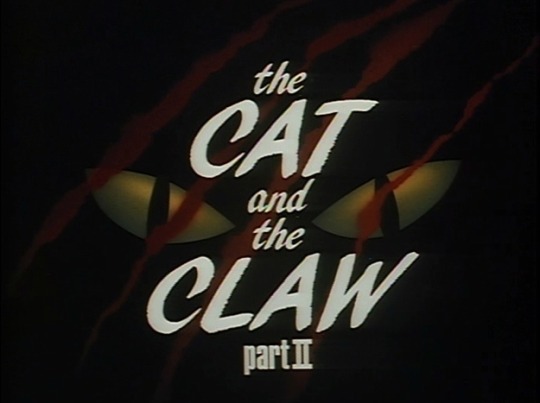
Curiosity killed the cat, but satisfaction brought it back. So how much did Part 2 of our first Catwoman story satisfy? Does it get a bowl of cream, or a spritz of water?
Episode: 16
Robin: No
Writers: Sean Catherine Derek (story), Laren Bright (story), Jules Dennis (teleplay), Richard Mueller (teleplay)
Director: Dick Sebast
Animator: Akom
Airdate: September 12, 1992
Grade: C
The first part of The Cat and the Claw had me interested, but certainly not blown away. It was a hit-and-miss episode with enough good ideas in it to allow me to enjoy it and wonder where the story was going to lead. I liked that it did give out a sense of substance, but honestly, I don’t think that the substance held steady between the credits of part 1 and the first scene of part 2. Part 2 does continue the story, but sucks out a lot of what made part 1 worth watching, and if I had never even watched part 2, I would not have been missing a damn thing aside from the realization that Catwoman ends up okay and the day is saved. But I think it was safe to assume that anyway, you know what I mean? Part 2 left very little impact on me, positive or negative, and for that reason I’m labeling it a C. Ironically, this is probably the episode with the highest stakes so far, right? With a conclusion that has a pretty epic scale. But it’s just not handled in an epic way. The concept is there, but the execution is lacking. Even if a studio like TMS or Spectrum were the ones to take care of the visuals, it still would have given the same feelings. The team knew what they were doing, giving it to Akom. Yeah, Akom’s work here is pretty bad, and Part 1 is more visually appealing in addition to being simply more entertaining. Even though it didn’t look the best, I could appreciate Sunrise’s unique style. When Sunrise failed, it still made for something that you don’t see everyday. Akom’s work was just plain old underwhelming. This is especially noticeable during the climax with their work on the fire (yeah, fire count, by the way).
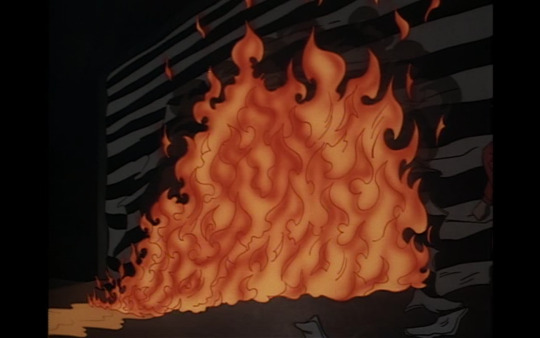

That fire looks like something from a Hanna-Barbera cartoon, guys. I’d expect to see similar on Scooby Doo. You don’t get a sense of the danger or the heat coming off that thing, and so you don’t get a sense of worry as Batman tries to get the hell out of there. Another very Akom scene is the car chase that happens when Bruce and Selena are together, out of costume. It looked laughably lame. That scene could have been so exciting and dynamic! But, at the same time, like I said, I understand why Atom was chosen. Even if the animation got me a little bit more invested, it still would have felt empty because of a lack of why I should be invested. It’s like watching a Transformers movie. Just brainless action. And why waste money on sending this episode to a better studio when a much better episode could be? The only real Akom-caused highlight was the train stuff. That looked pretty cool, likely because even though the train was moving, it still provided a static, stable platform for our characters, so it required less technical stuff to animate. All of the other cool stuff to look at was definitely in the storyboards. I liked the bit where the Bat Plane flew across the moon, kinda emulating that iconic moment in the 1989 film. And my favorite visual moment was when Selena’s secretary put on her glasses, and we see it via a POV shot. But then once things are crystal clear, a second later she walks into the shot, seamlessly transitioning it from POV to third person.
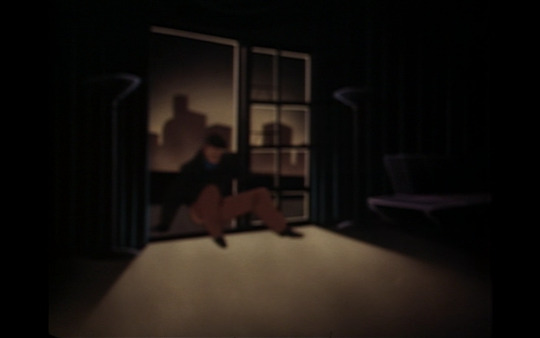
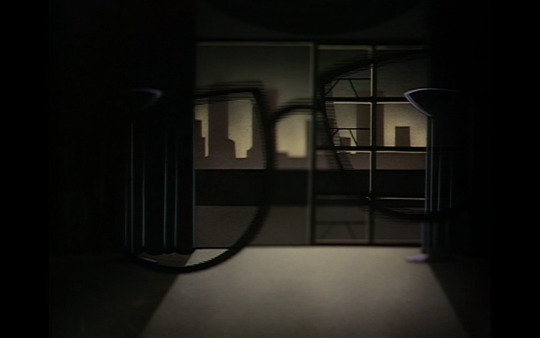
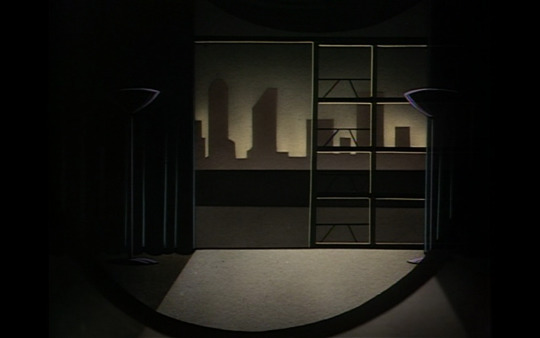

More things like that could have probably almost created a B-level of enjoyment, admittedly. This part is also campier than part 1, with a lot more cheesiness thrown in, and that is to the episode’s detriment. The idea of Red Claw’s group of terrorists stealing a vial of disease from a military-guarded train is a really cool one, and I’ll take that over another standard police chase any day (until those chases start getting more god damn interesting). But something about watching them ride their little vehicle, leap on top of the train like ninjas, walking around on the train effortlessly, and dismantling it was pretty hard to take seriously.
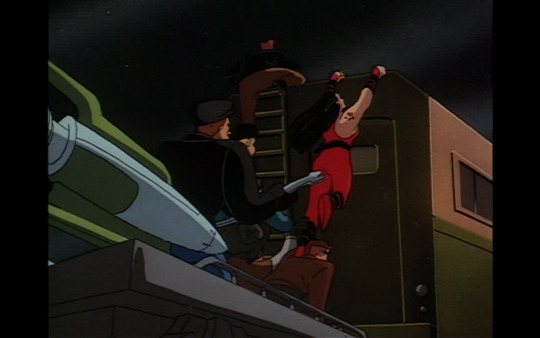

(This thug was in the last episode too, and he’s got this constant, static grimace. Makes me chuckle.)
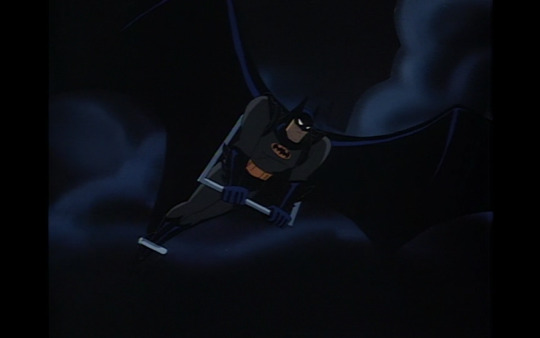
Seeing Batman glide in with the bat-glider for the first time was neat, but then again, we get flown into a corn field. This is some of the cheesiest dialogue/line delivery on the show so far, even dwarfing the stuff from I’ve Got Batman In My Basement. No easy task! It’s like the writers here were aware of the serious tone, and trying, but still could only make a guy dressed like a bat so rational. I especially cringed at Batman’s shock that Red Claw was a woman. Having Catwoman be an admirable, strong character is doing feminism in a cartoon right. But this episode was too on-the-nose about it. Another instance is when Catwoman and Batman are tied up. Catwoman says something about their savior being a “woman’s touch”, and then she claws them out. Outside of the show trying to push a feminist message, why, in universe, would she say that exactly? Batman was not being sexist toward her. Red Claw certainly wasn’t. Red Claw is a woman for crying out loud! And how are her claws particularly feminine, anyway? Are they supposed to represent those stereotypical secretary nails? C’moooooon. Lame, lame, lame. I’m a feminist, and I’m all about cartoons showing that women are every bit as capable as men are. But if this is how they do it, then just don’t even try. And to add insult to injury, after we get Catwoman saving both of them, we end with her getting the shit beaten out of by Red Claw in a fight, merely because she does absolutely nothing to defend herself. Catwoman is an athletic cat-burglar who, in the previous episode, managed to give Batman a challenge. And now she’s just letting Red Claw kick her over and over in a way she easily should’ve seen coming. What a…confusing approach.
While the superhero stuff was seriously below par, it’s slightly made up for because of how it explores Bruce and Selena’s relationship a little bit more. I liked seeing them on another attempted date, and so did Char! They’re really charming together, and it was incredibly satisfying to see Selena begin to enjoy his company. But as things start to go right for him, things also start to somehow go more wrong, and he discovers that Selena is Catwoman. To me, it’s believable that he wouldn’t have made that assumption right away. First of all, what are the odds. Second of all, a much different environment, mindset, and appearance. Plus, it’s not as though he was seeing Catwoman every single night, right? Most of his interactions of her was as normal human beings dressed in normal human clothes. Bruce mentions that he hasn’t felt a fondness of a woman like this in a very long time (Mask of the Phantasm entered my head for a second), and it feels so genuine. Somehow over these 16 episode and pilot, with a pretty small amount of spoken words for a main character, we’ve gotten to know Bruce…or…Batman…quite well. We can tell when he’s being phony, we can tell when he’s being sincere. This was sincere. And because his Bruce persona is such an exaggeration of his decency, spotting cracks in that just makes you feel something, man, especially when it shows us that hint of affection. This can be compared to Bruce Wayne talking to Harvey Dent about how proud he was that Harvey was seeking psychological help (Two-Face Part 1). These moments show us that Batman still has this warmth to him. It may be like a candle in the wind, fighting to stay alive, but every now and then there is a spritz of gasoline. For a second, Bruce Wayne and Batman are one. But y’know what? This is all well and good, however it makes me wish that the Red Claw stuff was absent. In part 1, it was different. I wanted to know where it was going. But without decent payoff, there is no reason for the terrorist story element at all. This would have been so much stronger if it were a half hour dedicated to building up the relationship of two troubled adults, fighting for what they believe in, succumbing to a certain level of darkness, all while not being able to find common ground. Paul Dini could have done it. Alan Burnett could have done it. Y’know what, Tom Ruegger probably could have done it. But no. We got writers who felt the need to add in that unnecessary, goofy superhero stuff that was not meant to be the focus of Batman the Animated Series when it didn’t need to be. But if there is one major strength of the superhero stuff, it’s the very ending. Because despite what Batman and Catwoman just went through together, saving countless people, Batman still needed to put her in handcuffs (and not in the way he probably wishes he could).

(Blurry screenshot, apologies...by the way, are bat-handcuffs really necessary, Batman?)
That was paaaaaainful, but the right kind of painful (again, not in the way Batman probably wishes it was). Having Batman state that he didn't want her taken away like a common criminal was a great addition, and I really want to know which writer came up with that line. Whoever did got what makes Batman and Catwoman so interesting. If only they could have gotten a crack at this episode on their own. As some final words, despite me giving this episode a C, I went back and forth between a C or a D many times. I’m still not entirely sure which is my true grade. It depended on what I was writing about. When I was complaining, I was sure that I should make it a D. But as I was talking about some of the more positive elements, I thought maybe a C was more appropriate. Bottom line, I’m not sure. I think a C is the most fair, though, because aside from just being a middle of the road grade, it could also represent me being completely confused on my opinion. Is that understandable?

(Here we clearly see that the section of the train that was bombed is still very much intact)

(Batman was very much on model throughout the episode, particularly in the face)
Fire count: 8
Char’s grade: B
Next time: See No Evil
Full episode list here!
#batman tas#dcau#dc animated universe#batman the animated series#the cat and the claw#the cat and the claw part 2#part 2#catwoman#red claw#batman
7 notes
·
View notes
Note
About you defending RWBY, as a RWBY fan, I am thankful that you defend it. At the same time, as a Legend of Korra fan, can you please stop putting down and nitpicking LOK to make RWBY look better? It’s just as much as a headache as anti-RWBY fans nitpicking and putting down RWBY.
Also, can you please stop putting down other shows to make RWBY look better as well? Each show is its own thing and it is not fair to pit their fandoms against each other (or alienating RWBY fans who like them).
(Last ask) I mean, it is fair to say “I hate these shows and think they are awful” (which means you judged the show on its own merits), it is not fair to say stuff “RWBY did everything better then these shows” (even if it is true in your POV, all it does is alienate people who are fans of both and it shows that you did not judge the shows on its own merit but rather to another show)
Handling all three asks at once:
Me comparing Korra to RWBY was not a compliment to RWBY in anyway. In fact, I usually use comparisons tp RWBY as INSULTS because no professional show should be worse than a show made by a bunch of amatures are their worst. When i say Berserk 2016′s animation is worse than RWBY’s, that’s not a compliment towards RWBY. That’s me being incredulous that an adaptation of one of the best manga in the existence has such piss poor animation that fucking Derpy Weiss looks good in comparison.
Likewise, when I say the writing of Legend Of Korra is worse than RWBY, I am livivd that something with everything given to it on a silver platter can’t do its job better than a show with damn near every disadvantage possible. It’s not me praising RWBY. If I did, I would be talking in a positive light like I do when I saw RWBY interests me more than almost every seasonal anime out there. No, it’s me screaming ‘why can’t you be at least decent?!’
Mind you, I wasn’t comparing Korra to RWBY initially. I was comparing Korra to AVATAR originally. And let me tell you, that made me even angrier. Because despite my feelings towards the original Avatar being fairly netural, I still consider far better than RWBY which should speak to it’s objective quality. And yet Korra never even came CLOSE to Avatar despite sharing a name. In fact, it kept fucking up stuff that Avatar basically HANDED to it (like the Avatar and what it was.) I was so disappointed and angry that I actually had to lower my standards quite a bit just to give Korra a chance. And yet it STILL FAILED. It was like watching someone lose a boxing match to someone several weight classes down…with their hands tied behind their back. Even so, I shouldn’t have done that since Korra held the name of Avatar and was a sequel thus it should at least keep a similar level of quality.
And nitpick? Dude, me saying that the show doesn’t contain the necessary pauses in human speech in order for the dialogue to feel natural and let things sink in isn’t nitpicking. Talking about how unlikeable Korra is to the point that the villians either have to be generic as hell (Tarlock) or they WILL out charisma her (Amon). And even after she stops being unlikeable, she’s still one note and boring. Or how things just don’t make sense in the series like how there is a portal into the Spirit Realm no one has ever mentioned nor has the two Spirit Gods ever been mentioned by anyone in the series, even other spirit. or the inconsistancies with Avatar like how the Avatar State can empower Korra despite having NO connections to any previous Avatars or how bending even first began. Those are not nitpicks. Nitpicks would be talking about how those triad dudes in the first episode attacked Korra with water and fire attacks when she is wearing a Water Trbe garb or how Tarrlok managed to hide his criminal father’s past from the entire republic. None of those actually matter in the end and can easily be excused or worked around. The stuff I did mention are big problems that it shouldn’t have.
Me comapring the series to RWBY was me ACTUALLY judging it more fairly because if I kept judging it as I did, I would have been a LOT less calm.
To me: Korra IS an objectively bad show. Not just as a successor to arguably the best of Western Animation but as a show on its own as well. It started iut so badly, got somewhat good in the third season before plummeting back into being bad in the fourth season. Me comparing it to RWBY is to show that it has no excuses.
I am not pitting their fandoms against each other or alienating each other (in fact, I AVOID DOING THAT): I’m just showing that Korra, even with everything a creator could ever want, failed.
2 notes
·
View notes
Text
Kenny Reacts to: Ramayana (& Hindu Mythology in General)
So, for those who don’t know, “Ramayana” is one of the big epics of Hindu Mythology, comparable to the Illiad or other legendary Kings such as David or Arthur, centering around Prince/King Ramchandr, one of the Avatars of Vishnu
My boyfriend (who happens to be Indian) introuced me to a TV show based on it, and I, being a mythology nerd, couldn’t resist...
Since a lot of people actually believe in this as a religion, first a disclaimer: I’m a complete atheist with no belief in the supernatural whatsover, but I’m a huge believer in the value of storytelling (and a writer - the more mythological references the better, at least if you’re aiming for as much of an ‘universal’ flavor as possible) and do hold that myth holds an important place in the human experience. I will be approaching this completely from a literature perspective.
My boyfriend is not a believer either, though he used to be an actual Hindu growing up & still has it as a cultural background (I know myself that the stories you’re brought up on do influence you just by the archetypes and poetic shorthands they make available to you) - apparently he found it quite interesting to see me react to it & see it properly from start to finish. (though it has actually caused a resurgence in childhood song earworms)
So, with that out of the way, let’s get to the actual “review”
What did I watch
It’s a somewhat older show from the 80s or 90s so the special effects could have been better - but I say that only because with a concept like “Demons versus monkey people” and “battles with dark sorcery and vaguely described divine weapons” there is a lot of potential for creative visuals.
In this implementation the style of costumes was more “historical” overall, but great care was taken nonetheless.
Indeed, though childhood nostalgia filter my boyfriend likes this particular version because it was made by an 80 year old dude who dreamt all his life of making a TV show out of this story & worked hard to make everything ~just right~ - there have been never, fancier interpretations since but they tend to be more generic & plasticy in terms of the actual screenplay (my boyfriend, though biased by childhood exposure, says that “You don’t get the feeling that you’re looking at Ram, you’re looking at a supermodel”) whereas in this one, the director took great care to write all the songs & handpick the actors -
Which, with those mythical, ‘archetypical’ characters is quite important, they have to have the right ‘aura’, ‘presence’ or ‘atmosphere’ around them to connect to the larger-than-life timeless ideas they’re intended to embody. They made sure to cast tall, wry dudes as the monkey people, had some really good acting, made sure supposed relatives actually look alike etc.
This adaptation (at least insofar as I’ve watched it) seems to have gone with the “good ending”, that is, the version where the Prince & his wife live happily ever after returning to their home city (for a change, the original/older one... though it makes little sense to debate about the true version of a myth, it’s their very nature to be passed around & reinterpreted and for each listener & reteller to put their own spin on it) - there’s a second one that’s much more anal about social divisions, harder on the mysoginy and ends with him disowning her ass, though there’s some ring to the idea of the Princess returting to whence she came (mother Earth) in humiliation. It depends on what sort story you want though it doesn’t seem to fit with Ram’s characterization as the type who always looks to resolve things peacefully & reasonably & think before acting, & he may lose some of what makes him interesting if you take that away.
Indeed the director saw the need to sanitize even the orginal “chastity test by fire” scene - more than I would have done even if I wanted the Prince to keep looking heroic, I suppose, a lot like how many Christians will explain away many inconsistencies in the bible (and pretty much everything in the book of Judges) because they need their headcanon to be consistent with what they associate with the deities.
The Cosmology
One of the interesting parts about this particular ‘verse that got me more interested in it beyond my initial watching of that show is the rather complex makep of the world -
In most places religion has gone though certain discrete stages in accordance to the civilization that thought it up, with the various ideas (animism, polytheism, dualism, monotheistm etc.) all influecing each other subtly by the need to react to each other but in this case you had this evolution happening gradually without the previous being completely discarded.
So you have river spirits, sacret trees, elemental monsters, demons, titan/jötnar like entities, your basic greek style deities, a big head honcho lord of the universe, concepts of self-enlightenment and pantheist universal unity all coexisting in the same setting.
It’s basically a religion kitchen sink. (and I mean that in a good way, though I get why some may prefer the more ‘streamlined’ ideas of modern Christianity or Islam)
Impressions & Surprising things
Very interesting - because of my familiarity with mythic universals & certain shared cultural roots ( They even have their own wandering handsy thunder god! - though he’s squarely in the middle of the cosmic hierarchy and seems to be the designated Worf Effect recipient) , I could count down all the tropes and see a lot comming but because of different cultural ideals there were many points where I REALLY didn’t know what was going to happen next
Also, it was a veritable soap opera and I did not expect the feels. The heroes were more adorable than I’d ever have thought.
The level of “Honor Before Reason” and “Because Destiny Says so” is about comparable to the ancient greeks, but the “humble sinless all-loving hero come to earth for an ardurous mission” might remind one of Jesus, especially in the conception that “The Hero”, in the most archetypical sense, is to be not just badass but moral - though rather, Jesus resembles Ramayana because Ramayana came several centuries first; Just a sign IMHO that there myths come from the human mind and humans everywhere are more similar than different.
Funny thing is, since christian apologetics have this complex to prove how “special” their religion is (I mean it is unique in that no one has the exact same combination of traits but that’s true of every religion and the elements are universal), they spend a lot of time dismantling Islam (often with bonus racism) but usually completely dismiss Hinduism because “Well, they’re polytheists” when the two religions actually have a lot of ideas in common - indeed a lot of beievers will speak of the Hindu Trinity (or their favorite part thereof) or the Mother Godess much like the average dualist or monotheist would talk of their god, like, “O supreme being that dwells in all goodness” etc.
Unlike Jesus (who, despite his popular interpretation, in the original bible had quite a temper) Rama’s patience & forgiveness is a bit less of an informed ability, though you do get the sense that this comes from a warrior culture as well as a very stratified society where living up to your given social role (including that of a wife) is everything - in a Western work Ram probably would’ve seized the city with the support of the citizens. XD
One could comment that Ram & his brothers are still royalty & that the focus is on that whereas Jesus deliberately took the shape of an ordinary dude, though Ram still gets to spend years as a hermit & Jesus is still convolutedly made to be descended from David - the Jesus myth being the way it is probably has more to do with the political circumstances of its origin (conquest by rome) than the nobler meanings ascribed to it later.
Another, subtler/ less apparent aspect of the destiny trap thing is that if everyone has their fate, no one can be blamed all too badly. (Deathbed redemptions galore) Nonetheless, as the prover goes, “karma is a bitch” and these people invented it.
That said, tough still a simplistic story (that purtports there’s only one clear universal law everywhere and that the good guys always win - That’s an air castle if there ever was one, we need to work for that) I was actually surprised by the sophistication of morals & politics at times, it went into specific questions (hypocrite accusations, hypocratic oaths, how to charioteer, what a good king should be like etc. )
This is probably an artefact of being written from the PoV of royals & warriors, or just an indication of the great asian civilizations having existed so long & relatively unbroken compared to the many shifts in where things where going on in the nothwest.
This is the first time in ANY mythical story that I’ve seen anyone raise the concern of preserving the innocent citizens of the enemy faction and how to stabilize the political situation afterwards (after dethroning the local evil overlord, they put in his turncoat brother who joined the good guys for damage control), something that I haven’t seen a SINGLE time in the Bible (and I’ve read the whole thing), though the heroes steer clear of the line to “simplistic stupid good” if you discount the “honor before reason” parts.
There’s 4 ways you can do ‘archetypical’ characters: Wholly & completely stick to the simple archetype, bring the archetype to full circle & detail while milking it for maximum symbolism, “not what they seem/contrast” and giving them depht without having them ever stop to be their archetype - it’s the latter that was done magnificiently here, especially in terms of 3Dimensional antagonists, they have enough redeeming qualities for it all to strike you as a tragic waste of life, but not enough to let go of their pride and avert the divine punishment.
(The “wicked cultured” Dark Sorceror Evil Overlord being interesting is a given, but of all characters, the cocky big mouthed Demon Prince was the last one I expected to have hidden dephts)
1 note
·
View note
Text
How Death Note Redeemed Itself In Its Final Episode
https://ift.tt/3fK2SPJ
This article contains major spoilers for both the manga and anime of Death Note.
There’d never been a manga (and later anime) quite like Death Note. A psychological thriller mixed with the supernatural, the series followed high schooler Light Yagami, who’s given a notebook with the ability to kill anyone whose name is written in it. The premise alone is incredibly enticing but it was the way Death Note evolved that made it a beloved and still talked about series to this day.
The funny yet dark interplay between Light and the Shinigami who gave him the notebook, Ryuk. The way Light was able to creatively use the notebook to kill. The absolutely bonkers ways he avoided getting caught, most famous of which utilized a bag of chips. Being forced to work with the frustrating yet tragic Misa. The absolute triumph of an episode where Light simply takes a walk with someone and desperately tries to figure out their name in order to avoid getting caught.
The series’ biggest draw, especially after it got started, however, was the mind game between Light and police consultant L, who had a strong suspicion of Light being the killer. Their back and forth, Light avoiding being exposed, L planting traps for Light to fall into, the friendship that may not have been for show on L’s side, earned the series much of its acclaim.
However, half way through the series, L was killed off. It was a major shock, the biggest twist yet. This changed everything. Who else could compare to the man who nearly exposed Light time after time? Was this the end of the story? Would it be possible to create a character not only beloved as L but also one that could keep the tension of the story as high as it had been?
For most fans, the series never recovered after this. Many jumped ship solely because L died. Others weren’t impressed with the attempts to replace L. The characters of Mello and Near had some potential but it was never properly utilized. Many of their attempts to apprehend Light fell flat in comparison to the first half.
This isn’t to say the second half doesn’t have some bright spots but it does drag in places and many fans gave up before the story ended. Which is a huge shame because the final story of Death Note, in particular the one that takes up the final episode of the anime, makes up for its entire second half. It pulls everything together for what is an immensely satisfying conclusion that makes a critical judgement call on everything Light had done up to that point.
By the time Death Note reaches this final episode, it seems as though nothing can touch Light. He’s killed millions of people. Yes, Near has turned some of his team against him (except the loveable idiot Matsuda), but Light is still in control. He has a man named Mikami killing for him, he avoids Near’s traps, kills Mello, and even boldly tells his team it’s okay for them to work with Near. However, Near manages to get Light to agree to their first in person meeting and the two, along with their respective team’s, meet up in a deserted warehouse. It’s there that the stage is set for the final episode.
Light has Near cornered. Near had made a plan to swap out Mikami’s notebook for a fake, but Light saw through that and, through a trademark Death Note convoluted plan, made it so Mikami actually had the real notebook hidden. He’s won. Mikami writes the name of everyone present besides Light. Light, his ego at an all time, desperately tries to hold back his laughter. He knows he’s won, that in moments everyone is going to die.
The final episode begins… and they don’t. Near had faked Light out and did manage to swap out Mikami’s notebook for a fake. Light is exposed… and finally brings to the forefront a core question the series had been asking but refused to give a definitive answer on, not even in the first half: Is Light justified in his actions?
Look, I love Death Note. It’s a really fun watch and, because it’s a piece of fiction, you don’t have to be totally disgusted by a guy murdering millions of people. The fact he uses a magic notebook to do it makes it a unique take on the thriller genre. The problem is a large chunk of the series is told from Light’s POV. He makes it clear he wants to kill criminals the police won’t. That killing criminals makes the world a better place. The fear of being killed by an unseen force deter others from committing crime.
This wouldn’t be an issue if the show made it clear from the jump that this is still wrong, but it actively plants seeds of narrative doubt that maybe the authorities shouldn’t even be trying to catch Light. His actions are extreme, sure, but aren’t they needed to make the world safer? It makes viewers or readers ask the question: Is Light committing mass murder making the world a better place?
This is a dangerous topic to play with. I’m all for using fiction to explore hard concepts but the show needed to come down hard on his actions. They couldn’t condone them; it would be the show telling its audience, “Hey, mass murder is legit!” Even if the show left Light’s action as ambiguous that also would have been a problem. It would leave too much wiggle room. Too much of a chance for Light’s actions to still be seen as viable. At first, it seems like this is exactly what the final episode is doing. After Light’s finally discovered as the serial killer he is, he goes into full ego mode. He declares himself god, the only hope for mankind and explains that because of his actions, “wars have stopped and global crime rates have been reduced by over 70 percent.”
Read more
TV
Death Note Cast & Director Talk Changes from Manga
By Matthew Schuchman
Movies
Death Note Review
By David Crow
Light doesn’t even frame this as an evil action he needed to take in order to make the world better. No, instead he sees himself as good! He tells everyone that someone has to do this… but no one would have gone as far as he did. The world needs him to fix it. He needs to keep killing. This could have been the show’s only statement on Light’s actions. That he had a point, flawed as it was. It would have been so easy to leave the door open, to make the series as edgy as possible and have Light be sympathetic right to the end.
But it doesn’t.
In the most critical moment in all of Death Note, right after Light gives his big speech, Near shuts him down: “You’re just a murderer, Light Yagami. And this notebook is the deadliest weapon of mass murder in the history of mankind.” He goes on to say that Light has confused himself with a god when in fact, “you’re nothing more than a crazy serial killer. That’s all you are. Nothing more and nothing less.”
Light is not justified in his actions. This is the concluding statement of Death Note. It’s ultimate answer to the question of Light being justified or not. It isn’t entertaining the idea of Light’s actions. Any reason the show has given you to sympathize with him goes out the window. He’s completely in the wrong. There’s nothing noble about what he did. He’s a murderer and simply killing all criminals without any kind of oversight is wrong. He thought he was god for doing this but in the end that was what did him in.
Light’s fall from grace and ultimate rejection by the series is further driven home when Matsuda, the clown shoes of the series, shoots Light in the hand. Light tries to appeal to him but he refuses to listen, shooting Light four more times. He’s only prevented from killing Light by the other offers. Light manages to get up after this and run away and Near lets him. He knows Light is about to die. This was yet another moment the show could have tried to make you feel pity for Light. That yeah, he was wrong, but he at least had good intentions and isn’t it sad he’s about to die?
Nope. Ryuk comes along and writes Light’s name in his own notebook. Light has truly lost. Before Light dies though Ryuk reminds both Light and the audience of what Light said early on in the series when asked why he was passing judgment on others: He was bored. For all the grand posturing of being god and making the world a better place, this was all because Light was bored. He’s no hero. His philosophy shouldn’t be looked upon as something noble or horrible but necessary. He’s just a horrific person who dies alone.
Even the short manga sequel to Death Note drives home the point that Light was wrong. Another human, Minoru Tanaka, is given the Death Note years after Light’s death and Ryuk wonders if Light is considered one of the greats of history. Minoru explains that while some consider Light god, it’s actually taught in ethics classes that Light is evil. He was also taught in world history classes that Light was, “a mass-murdering terrorist, the worst in recent history.”
The story actively refuses to give Light’s actions any justifications. He was committing mass murder. If the story had simply ended at the half waypoint, L’s death, it would have been deeply problematic. It wouldn’t have answered the question of whether Light was justified or not. It would have left open the idea that maybe he was, at least from the perspective of the narrative itself.
cnx.cmd.push(function() { cnx({ playerId: "106e33c0-3911-473c-b599-b1426db57530", }).render("0270c398a82f44f49c23c16122516796"); });
This is what makes the final episode so important. It not only answered that question of whether Light was justified, but also took a very hard and definitive stance against it. It refused to entertain any notion that Light was in the right and Death Note was all the better for it.
The post How Death Note Redeemed Itself In Its Final Episode appeared first on Den of Geek.
from Den of Geek https://ift.tt/3uNHQUL
0 notes